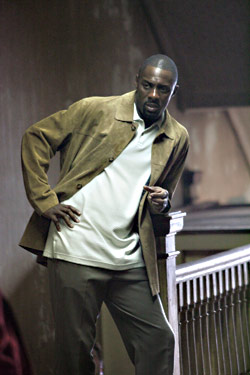“Sodja see the latest episode of [fill in program name here]?”
“I don’t watch much TV.”
“No, but [name of show] is different.”
“It’s a cop show, right?”
“Yeah, but you really ought to check this one out.”
So you check it out, and sure enough, it’s the same old same old all over again.
Except when it isn’t. The Wire is a cop show; it has chases and pat-downs and squad rooms and crime scenes, but the resemblance to CSI: Anytown stops there. The only dramatic series I can think of to compare it to is the one that played the Globe back in the early 1590s.
I grant you, the show’s writers don’t even try to match the thunderous dialogue bandied about by Shakespeare’s warring royals, but the killers and dealers, junkies and delinquents who inhabit The Wire‘s West Baltimore red-brick wasteland speak a poetry of their own. Some of them— shotgun-toting Omar, drug kingpin Avon Barksdale among them—could teach Richard III a thing or two. And Stringer Bell, doggedly pursuing his version of the American Dream to its bitter end, is brother beneath the skin to Macbeth.
The Wire and the city of Baltimore can’t be separated. The roots of the show go back to 1992, when Baltimore Sun reporter David Simon and retired Baltimore homicide policeman Ed Burns began a three-year collaboration researching one small patch of the city’s flourishing drug marketplace. The result was a book called The Corner, published in 1997 and filmed, lightly fictionalized, for an Emmy-winning HBO miniseries in 2000.
By that time, Simon was working as a writer for Barry Levinson’s Baltimore-based Homicide, while Burns was trying to keep his sanity teaching at an inner-city middle school. The success of The Corner, an excruciatingly intimate look at a family’s suffering, led them to pitch a new project to HBO: a series, still focusing on the “war on drugs,” but revealing the larger social, political, and economic forces that shape an aging American city. HBO was dubious at first: Networks do cop shows; why should we do one? But Burns and Simon ultimately prevailed. Cop shows, they said, even the most sophisticated, are about good and evil, crime and justice. “We are bored with good and evil. We renounce the theme.” The Wire would not be about its characters; its characters would body forth the city they inhabit.
One of the most astonishing things about the show is the catholicity of its casting. Without reference to Rafael Alvarez’s book on the show Truth Be Told, I defy anybody to say with certainty which of the players is professional or just off the street, picked up locally or brought in from outside. The twin protagonists of the first three seasons, white loose-cannon cop Jimmy McNulty and drug entrepreneur Russell “Stringer” Bell, are, against all logic or probability, both played by British actors: Yorkshire-born, Eton-educated, classically trained Dominic West and the London born actor-DJ Idris Elba, respectively.
It is in Elba’s performance, composed like a great portrait out of innumerable small touches over three years and 37 episodes, that the extraordinary power of The Wire shows best. Beside his quicksilver, street-smart partner Avon (Wood Harris, sleek and dangerous as a cobra), Elba’s Bell seems big, slow, faintly comic, faithful, dependable, and dumb: faithful like Iago, it turns out, dependable as Cassius, and stupid only for believing that the civic establishment he dreams of entering is as honest as he is.
The fourth season of The Wire kicks off Sept. 10 on HBO. That gives you just about time to catch up on the first 37 hours of the show, all now available on DVD. I know it’s a lot of time to set aside, but none of it will be wasted. Honestly, this show is different. You really ought to check it out.








